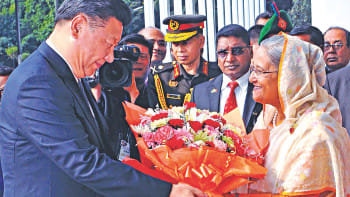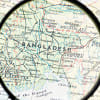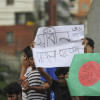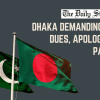Bangabandhu’s foreign policy legacy can still guide us

As the nation this month is steeped in mourning commemorating the 47th anniversary of the dastardly assassination of our founding father Bangabandhu Sheikh Mujibur Rahman and almost his entire family, it would behove us as a nation to introspect and reflect deeply as well on his abiding legacy that many of us appear to have taken for granted and relegated to the side-lines.
Fifty years ago, when Bangladesh emerged as a sovereign, independent state after having wrested its independence from Pakistan through a blood-soaked 9-months long Liberation War, it had been written off contemptuously as a "bottomless basket case" – an epithet that still rankles with us. Today, 50 years later, Bangladesh is a very different country. Bangladesh's progressive transition, from a "bottomless basket case" in 1972 to lower-middle income status in 2015, from LDC in 1972 to developing country status now, reads like a fairy tale.
Bangladesh today is set to graduate from LDC to developed country by 2024. According to the World Bank, it is "a model for poverty reduction". Its projected GDP for 2022 is estimated at USD 400 billion, increasing to USD 430 billion in 2023. Its GDP growth in 2021 was 6.94 percent (but real GDP in 21-22 is claimed at 7.25 percent). The projection for 2022 is 6.6 percent according to the WB (or 6.9 percent according to ADB), while for 2023 it is likely to be 6.3 percent (WB) or 7.1 percent (ADB). Bangladesh has been among the fastest growing economies during the last decade not only in the region but globally. It is ranked as the 41st largest economy globally, (2nd largest in South Asia) and projected to be the 28th largest by 2030.
It aspires to be an upper-middle income country by 2031. Its poverty declined from 43.55 percent (1991) to 14.3 percent (2016) – (based on the international poverty line of USD 1.90/day), while extreme poverty has been reduced to 10 percent and is expected to halve by 2030. Its per capita income today, (according to Bangladesh Bureau of Statistics data) is USD 2,824. Many of its Human Development outcomes improved, and it has actually better HDI than most of its neighbours. Its GDP growth steadily increased from 2009 (5 percent) to reach an all-time high of 8.2 percent in 2020, before taking a palpable hit from the Covid-19 pandemic (5.2 percent).
Today, Bangladesh has acquired food autarky. It has even extended fiscal support to Sri Lanka in 2021-22, and disaster management assistance to Maldives. It has also had to, perforce, provide shelter to over 1.2 million refugees from Myanmar since 2017.
Today, Bangladesh is not an inconsequential country anymore. Its geostrategic importance has catapulted astronomically with global focus swivelling to the Indo-Pacific region.
What enabled us to survive and grow?
Ensuring survivability of the state under very hostile circumstances in a deeply divided world was an imperative sine qua non for Bangladesh. The country's founding father Bangabandhu Sheikh Mujibur Rahman understood only too well that in the post-colonial neo-Westphalian world disorder in which his newly founded state had emerged, every state is a part of a greater comity of nations. To survive viably, it had to first navigate through very treacherously mined waters and numerous hidden shoals that lay ahead in its voyage as a new state. A visionary foreign policy was among the first priorities of the day in early 1972.
The imperatives of adhering to a balanced foreign policy
A fundamental dictum in foreign policy formulation and analysis is unquestionably this: each country, as a sovereign, independent nation-state, contextualises its every move or action within the overall rubric of preservation and advancement of its own national interest, of maintaining a happy equilibrium between its boundless aspirations and the numerous challenges to the new state's viability. These foundational precepts must be buttressed by a hard-nosed pragmatism and understanding of the inescapable reality that while one may choose one's friends, one cannot choose one's neighbourhood; and that while friendship may exist between peoples and persons (which even then are vulnerable to change), "friendship" between states is primarily driven by the national demands of each state professing such friendship, rendering such friendship very protean in nature.
In this context, friendship between states may best be described as the state of relatively happy equilibrium between two or more states that have managed to arrive at a mutually acceptable alignment or co-existence of their national interests that serves everyone in perceptibly equitable measure.

Fifty years later today, the wheels of history have turned full circle. The world is, once again, in the grip of another cold war brewing, with a somewhat different configuration of protagonist and antagonists still in the process of kaleidoscopically fluctuating alliances. Tearing at us all globally today are ranged deeply divisive forces, some new, some malevolent offspring of the old. We see conflicts still raging between nations, indirectly and directly.
On our western horizon, in our immediate regional neighbourhood, we are witnessing live an internal churning evocative of a darkly foreboding resurgence of the divisive narrative of the thirties, that drove and tore the sub-continent apart. The "cold-hot" conflict between India and Pakistan is much worse today than it was at the time of our independence, the dangers exacerbated by their both being armed to the teeth, primarily against each other, with conventional and nuclear weapons.
Craning further west, at one stage of separation, we see Afghanistan (with whom we had enjoyed excellent fraternal relations at the time of our birth), now plunging into uncertain implosion with the previous established government overthrown chaotically by the Taliban. Panning further west, we see horrendous effects on multitude of innocents caused by the continuing hostility between the states that control the heartland of fossil fuel reserves of the world – the Persian Gulf. The continuing "war-fought- at- distance" between two major Gulf powers, Saudi Arabia and Iran in Yemen shows no sign of abatement, being culturally and ideologically inimical to each other, even though professing to share the same faith. An extension of this struggle magnifies and becomes more intangibly complex even further west, in what is known historically as the Levant.
Shifting our lens further west and north-west, we see new ideological or ideational struggles manifested in severe churnings domestically as well as across borders in the larger European arena, with Ukraine burning and reeling from Russian assault. If the flames of the current proxy war in Ukraine are not doused quickly, they may transform into a "Third World War" that no one wants, with Europe once again becoming the hapless main theatre.
In the USA, we witness a surreal revival of the "Civil War syndrome" playing itself out uneasily, with a sharply and viscerally divided polity pitted against each other short of being dug in trenches with bayonet-fixed guns pointed at the "enemy".
Swivelling our gaze to our east now, we see our immediate neighbour Myanmar (with whom we had fairly good relations in the seventies) in the throes of imminent implosion and possible state failure – an implosion that will be followed by the probable explosion of multiple cluster bombs that will not leave any of its neighbouring states, including a relatively stable Asean group, untouched. Bangladesh is already bearing the cost, by sheltering over a million refugees from Myanmar.
Further to our east-northeast, we see the rising Red Star of China, its eyes resolutely, and impatiently, set now to inexorably taking on the role in the 21st century as the world's largest economy and new superpower, nudging well aside the superpowers of the 20th century. We glimpse at a still divided Korean peninsula, one nuclear armed, both with different, ideologically antagonistic allies; and a struggling Taiwan trying to evade falling gravitationally into mainland China's lap. All these do not lend to any sense of composure.
And so, here we are, geo-strategically caught squarely in the middle, with the rising but internally troubled power that is India (which surrounds us on all sides) and the next neo-superpower that is China (geographically located at one stage of separation from us to our north-northeast), both engaged now in vigorous shadow boxing and a very risky brinkmanship in the deadly arena located at the Himalayan heights. In our Bay of Bengal and the Indian Ocean region we see two competing, even contesting, narratives, namely the Indo-Pacific Economic Forum (IPEF) led by the USA and the Belt and Road Initiative (BRI) spearheaded by China, on the verge of clashing. Bangladesh is like a brittle walnut in the relentless jaws of two mighty nutcrackers pressing hard on us.
Compounding all the above is the inescapable fate that global warming and its deleterious effect on climate change have pushed Bangladesh into the list of most vulnerable countries globally. This last imminent danger, of existential consequence for us, fuels our leadership role in all climate-related fora and strive for at least a minimum regional collaboration pending the more difficult task of global convergence on issues.
Bangladesh's critically important geostrategic location is highly vulnerable
Today the focus of attention by almost all major, middle, or minor powers has pivoted to Asia. Contextually, the Indo-Pacific region is strategically at the heart of Asia.
If in our mind's eye we can disembody ourselves and reimagine our planet viewing it from outer space, we would see an Oceanic planet with 71 percent of its surface immersed in deep waters. We would see our location as being uncomfortably at the epicentre of this oceanic world. This heightens the perception of us as being of strategic importance. The increasing attention on Bangladesh emanates from it being perceived as a bridging nation located at Asia's very epicentre. This lays us open to vulnerabilities as never before, but also places on our shoulders a very onerous responsibility as well.
Bangladesh's prosperity historically was derived from its locational advantage that today is much enhanced, and in future will continue to be derived from this bridging role. Successfully sustaining this role will also depend on its ability to maintain the best of relations with all countries, whether located near or far from it.
Our salvation lies in hewing to the fundamental moorings of our foreign policy that had been laid by Bangabandhu in the early years of our independence. We must adhere, without wavering, to the bedrock principle of "friendship to all with malice towards none". We cannot afford to align ourselves with anyone, against anyone. On the contrary, the current diverse challenges described above all demand, compellingly to my mind, that we do, in geo-strategic and geo-political terms, recalibrate the tools and policies we inherited from Bangabandhu to truly transforming ourselves into the "Switzerland of the East", anchored by "positive neutrality".
On this occasion of mourning his dastardly assassination 47 years ago, let us therefore reflect on the timeless legacy that he left us of the principles of our foreign policy, that enabled our fledgling state to survive and grow in the last 50 years. Let us today reaffirm our continuing commitment to abide by those fundamental principles and chart our course judiciously and pragmatically for the next 50 years.
This article is based on a keynote address by the author at a seminar to celebrate Golden Jubilee of Bangladesh's independence, Bangabandhu's birth centenary and 50 years of relations with EU.
Tariq Karim is a retired ambassador, and currently the director of the Center for Bay of Bengal Studies at Independent University, Bangladesh (IUB). Views expressed in this article are the author's own.

 For all latest news, follow The Daily Star's Google News channel.
For all latest news, follow The Daily Star's Google News channel. 









Comments